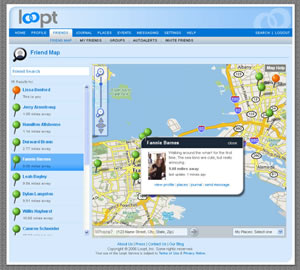Working on a university campus, I’m constantly amazed by the number of wireless phones I see glued to the heads of 18 to 22 year-olds in Madison. Any guesses as to the number one phrase I overhear when walking down the hallways and sidewalks on campus? That’s right, “Where ya at?”
That simple question leads to the market potential of a small California startup company called Loopt. I first heard of Loopt last summer, and have been watching them very closely since.
Unlike family locator systems offered by many major wireless carriers, where a designated phone (presumably a parent) can locate the whereabouts of a family member’s phone and map it on their desktop computer or mobile phone screen, Loopt is a bit different. In the words of their marketers, “Loopt turns your mobile phone into your social compass.”
It works something like this: you and your friends sign up for a monthly service on your GPS-enabled cell phones, and in return you get a mobile application that shows a map of where you are in relation to your friends. Interestingly, the system has an alert system that pops up when you are near a friend. You can also share geographic points of interest within your “social network.”
Loopt is currently only available on Sprint, Nextel, and Boost Mobile networks, with yet-to-be-delivered promises of extending their services to other carriers. Interestingly, when I inquired at a local Sprint store about the availability of Loopt on their equipment, they looked at ME like I was looped. They had never heard of it, even though the $3.00 monthly fee apparently shows up on your Sprint bill. But the salesperson said it sounded very interesting, and that he would “look into it.”
When you consider that almost everyone carries a wireless phone, the market potential for a service like Loopt seems huge. Personally, I’d love to be able to see where my wife is on her commute home, and she probably wants to know where I am too!
Sadly, I don’t have Sprint service, so I haven’t been able to try out the Loopt system. Has anyone out there given Loopt, or any similar systems, a whirl? If so, I’d love to hear what you thought.
It will be interesting to see if Loopt survives in a competitive marketplace, or maybe more likely, whether they are bought-out by a major wireless carrier in the near future.

